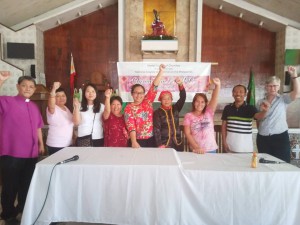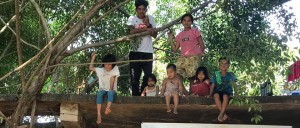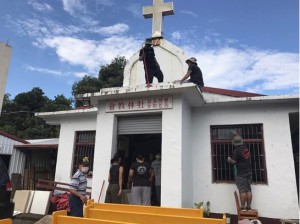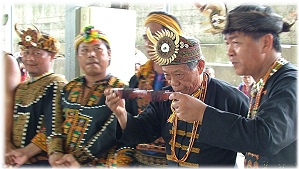 ~by Dato Reynaldo – Chief of the Lumad of Kamansi
~by Dato Reynaldo – Chief of the Lumad of Kamansi
雖然要去的地方是看起來的充滿熱情的島嶼,但是卻也是我第一次參與國際會議帶著莫名的害怕,因為菲律賓從2019年1月1日至7月20日登革熱疫情已達146,062病例,造成622人死亡,也就那麼剛好發生在我們要去拜訪的民答拿俄。然而,也不幸地,全島目前菲律賓政府列為戒嚴地區。
我們沒有花很多的時間在會議桌上,倒是實地參訪人權受到壓迫的地區,聆聽在地的故事。我被分到要拜訪菲律賓的民答拿俄,真實的體會在地原住民(Lumad)的心聲。我彷彿親身體驗台灣正在戒嚴的情景,第一天就哭的唏哩花啦,因為這些受壓迫的事情正在發生。Lumad人從2018年的六月起,就被迫遷移到其他地方,離開自己的傳統領域,因為政府覬覦他們的土地。他們的土地有豐富的自然資源,金礦,肥沃的土地,溫泉,與地熱。此外,原本應該傳承他們文化和信仰的學校,也被迫關閉。 ….閱覽全文請至:http://paiwan.com.tw/UniandUbak/?p=54
分類彙整:51.English
本中會資訊網依國際瀏覽計數器資料,提供給國際人士瀏覽。
你們的故事是我們的痛
 很難想像當你的孩子無故被殺時,警察告訴你:「你不能過去抱他!?」
很難想像當你的孩子無故被殺時,警察告訴你:「你不能過去抱他!?」
很難想像一夕之間,部落的領袖突然死了、當你回到家時,發現親愛的母親被逮補。
但是警察卻告訴你-你不能申訴?!
我親愛的弟兄姊妹們(Lumad),
聽完你們的故事,即便想裝堅強也不行了。
怎麼能夠…
我知道要叫你們要保持盼望那是一件很難的事
…..閱覽全文請至:http://paiwan.com.tw/UniandUbak/?p=51
普世即在地化
 上週參加排灣中會的一場活動,突然有位很久不見的kina用很憐憫的眼神看著我們:「你們現在的服事還好嗎?」,「可以啦!」我想也沒想的就回了。結果這位kina 說他們上次來到我們牧養的部落,為我們在病痛的長老禱告。結果我們的長老就告訴他們:「有空來這們這裡啊!為我們的傳道師禱告,他們好可憐喔~」。
上週參加排灣中會的一場活動,突然有位很久不見的kina用很憐憫的眼神看著我們:「你們現在的服事還好嗎?」,「可以啦!」我想也沒想的就回了。結果這位kina 說他們上次來到我們牧養的部落,為我們在病痛的長老禱告。結果我們的長老就告訴他們:「有空來這們這裡啊!為我們的傳道師禱告,他們好可憐喔~」。
但想想如果沒有現在在偏鄉的磨練,真的無法經驗同在台灣這一塊土地,卻有如此不同的國度。不僅跨出同溫層的彼此相顧,更是看到不同的視野,訓練自己的韌性。
最近看宇宙光雜誌的報導⟪偏鄉的真實需要⟫提到一個社區就算再怎麼貧弱,只要那個社區有一個好的老師和一對相處融洽的夫妻,就能讓下一代成為社會的助益,成為偏鄉的需要。 …全文閱讀請至:http://paiwan.com.tw/UniandUbak/?p=28
Ecumenism in Local Place
Last week, we had attended an event hosted by Paiwan Presbytery of Presbyterian Church of Taiwan. We met a “kina” (mother in Paiwanese), who gently asked us “is it going well in your ministry?” “Nothing to worry!”, I replied. The kina continued to say that, few weeks ago, she had come to our church, and prayed for our elder who was in pain. The elder told her, “Please come to our place and pray for our pastors. They need much mercy.”
However, if we have no experience of local pastoring, we cannot truly understand the differences happened in Taiwan. We cross over our familiar places, broaden our vision, and train ourselves to much possibility.
Recently, I’ve read a report from Cosmiccare, named “The Real Needs from Rural Places”. In this article, it said that even if there is a weak community with poverty, a good teacher and a couple might become a help and serve the needs of community…..→http://paiwan.com.tw/UniandUbak/?p=28
Millet Culture of Paiwan Tribe
本中會資訊網依國際訪客計數器,瀏覽國家數均再增加,為拓展國際瀏覽本中會網站,嘗試提供英文作品,先由師丈賴約翰拋磚引玉,歡迎本中會牧者弟兄姊妹提供200字內「福音與文化」作品。由小米園網站工作室提供英文翻譯。若自己可直接撰英文,非常歡迎。
……………………………………………………………………………………….
Millet Culture of Paiwan Tribe
◎Written by Zi Gao(滋膏;賴約翰) ◎photos by Zi Gao

Millet culture is called Masuvigu in Paiwan dialect. Millet Festival is to celebrate the harvest festival and is also known as Harvest Festival, to celebrate the harvest. It is also the beginning of month calculation of Paiwan Tribe. In the past, Paiwan Tribe calculates the age by the number of Millet Harvest. It plays a great role in the harvest festival. Millet festival also means a lot in the life of Paiwan Tribe.
Millet serves in many ways. It can be brewed into wine, cooked into rice, Cinavu, and Avai a kinpelj, etc. Wrap millet into Avai a kinpelj or Avai a kinpelj as the noblest foods of Paiwan Tribe. These two are the required gifts in festivities, births, trips, sacrifices, serving in army, and marriages. They represent the most sincere and highest respect.
Therefore, Pazazeliuliulj before harvest and Masaseljevaleva after the harvest were created from planting millet—opening up, seeding, removing weeds, and cooking.
※ Italics refer to the technical terms in Paiwan dialect.
……Complete reading→http://paiwan.com.tw/formosa/index4a.htm
